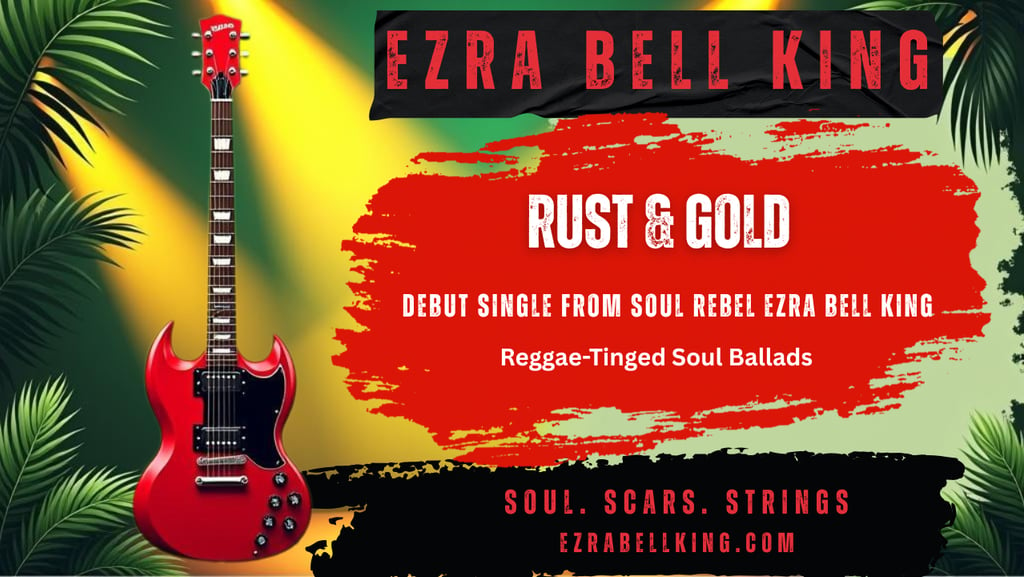
Rust to Gold: The Unlikely Birth of an Anthem
This blog post will provide substantial, meaningful content that will engage fans and firmly establish the rich, authentic world of Ezra Bell King
Steve D
10/7/20254 min read


Rust to Gold: The Unlikely Birth of an Anthem
There’s a moment in every Ezra Bell King concert, usually about three songs in, when the room shifts. The ambient chatter fades, the clinking of glasses stills, and a collective focus settles on the man in the slate-gray shirt, black beanie, and those impossible-to-miss yellow sneakers. His hands, weathered and sure, find their familiar place on the fretboard of his cherry red SG. He doesn’t say a word. He just plays the opening, clean guitar lick of "Rust & Gold." And from the first note, everyone in the room understands. This isn't just a song; it's a shared confession. A creed.
But where did this anthem come from? How does a song become the emotional anchor for so many? The story of "Rust & Gold" is the story of Ezra Bell King himself—a story of learning to see beauty not in spite of the damage, but because of it.
The Genesis: A Crack in the Facade
The story goes that "Rust & Gold" wasn't born in a pristine recording studio, but in the quiet, lonely hours after a gig. Picture it: a small, dimly-lit backstage room, the scent of stale beer and old wood lingering in the air. The adrenaline of performance has faded, leaving behind the stark silence that only follows shared noise. Ezra, looking at his own reflection in the polished body of his guitar, noticed something. A new scratch, a small ding near the pickguard earned from the night's passion.
For most, it would be a flaw. A thing to be buffed out or, at best, ignored. But for Ezra, in that moment of post-show vulnerability, it was a revelation. That scratch was a memory. That ding was a story. He looked at his own hands—the calluses, the slight tremor of a man who’s worked hard with them his whole life—and saw the same map of experience. The line, "This old guitar has got some dings and scratches / Just like my heart, after all these matches," didn't feel written; it felt excavated. It was a truth that had been waiting to be uncovered.
It’s a feeling anyone over the age of 30 knows intimately. We spend our youth trying to stay pristine, to avoid the dings and scratches. We buff out our imperfections, hide our mistakes. But life, if you’re living it right, leaves marks. "Rust & Gold" is the moment you stop fighting that reality and start appreciating the patina of a life fully lived.
Lyrical Breakdown: The Philosophy in the Verse
The song’s genius lies in its simple, profound metaphor. Let’s break it down.
"You walked out, left the strings untuned / I'm staring at the silence in this dusty room..."
This isn't just about a romantic breakup, though it certainly includes that. This is about any kind of abandonment. A lost job, a faded dream, a friendship that dissolved. The "silence" is the absence of what once was, and the "untuned strings" are the symbol of a life thrown into dissonance. It’s the "rust"—the feeling of being corroded by disappointment and neglect."But what they call rust, I'm callin' gold..."
This is the pivotal turn. This is the decision. Society often tells us that wear-and-tear is a sign of failure. That we should hide our age, our scars, our past struggles. Ezra bellows back with a defiant, soulful correction. The rust isn't a sign of decay; it's a sign of endurance. It's the evidence that you’ve weathered storms. That you’ve been tested and are still here. In that endurance lies a priceless value—the gold."Yeah, these yellow shoes still know the groove / Got nothin' left, but somethin' left to prove..."
The yellow sneakers, a signature part of his look, become a powerful symbol here. They are a splash of defiant joy. They say, "I may be battered, but I haven't lost my step. I can still move. I can still dance." It’s a declaration that the music—the rhythm of life, of hope—is still inside, waiting to be expressed.
The Musical Alchemy: Marrying Melody and Message
The music of "Rust & Gold" is perfectly crafted to support its lyrical weight. It doesn’t start with a bang, but with a tentative, clean guitar riff. It feels like the first, cautious steps out of a dark place. Then comes the warm, steady bassline—the heartbeat of the song, persistent and unwavering.
And then there's Ezra's voice. That instrument, weathered and raspy, is the song's most powerful asset. He doesn't sound like a young pop star singing about hypothetical pain. He sounds like a man who has breathed in the dust of that "dusty room." The slight grit, the raw emotion in his delivery, makes the message believable. When he sings about turning rust to gold, you trust him, because his voice is the sound of that very alchemy happening in real time.
The steady, "one-drop" reggae rhythm is the final piece of the puzzle. It provides a resilient, forward-moving groove. It’s the sound of getting back on your feet, of continuing the march, not with blind optimism, but with determined resilience. The rhythm says, "The road is hard, but we keep walking."
Fan Stories: The Song in the Wild
We’ve seen the letters and heard the stories. A woman who played "Rust & Gold" after surviving a severe illness, the scar on her chest now a badge of honor she calls her "gold." A man who lost his business of 20 years, who told us the song gave him the perspective to see his failure not as an end, but as the beginning of a new, wiser chapter.
This is the true power of the song. It gives people permission to reframe their own narratives. It provides the vocabulary to look at their own scars—be they emotional, physical, or spiritual—and not see ugliness, but beauty. Not evidence of failure, but proof of survival.
Conclusion: The Anthem We Didn't Know We Needed
"Rust & Gold" is more than the debut single that introduced Ezra Bell King to the world. It is the foundational statement of his entire philosophy. In a world obsessed with the new, the shiny, and the perfect, Ezra offers a different, more profound ideal: that true value isn't found in avoiding the elements, but in being shaped by them. That the most beautiful stories aren't the ones without conflict, but the ones where the hero bears the marks of the battle with pride.
So the next time you hear that opening guitar lick, take a moment. Look at your own dings and scratches. And remember, what the world calls rust, you can call gold.
Connect
Stay updated with Ezra's latest music.
Follow
Contact
ezra@ezrabellking.com
© 2025 Ezra Bell King. All Rights Reserved
Legal